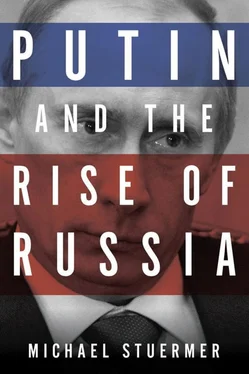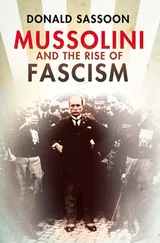The Chechen rebels’ attack on Daghestan brought developments to crisis point. It was open rebellion against Moscow. Rasayev, the rebel leader, promised an Islamist state and threatened to cut Russia off from the Caspian Sea; this of course would affect one of Russia’s most important oil pipelines. The rebels were well armed with money and weaponry, some of it sophisticated. Where did the money and arms come from? And who were the fighters? Some obviously came from Pakistan, from Afghanistan, from Saudi Arabia, suggesting a concerted effort by radical Islamists planning to set up a bridgehead inside Russia. Moscow’s rumour mill was in full swing, producing likely and unlikely scenarios, from an Islamist conspiracy to the hand of the Kremlin directing a spectre to frighten the people, justify strong-arm politics and secure the presidential elections. The Russian troops sent into the province, mostly raw recruits, were ignominiously repulsed. Some of their weapons, sold or captured, turned up on the other side.
This was not a time for the faint-hearted. The Kremlin fired Stepashin, whose half-hearted crisis management had allowed things to go from bad to worse. On 9 August 1999, Vladimir Putin was appointed prime minister. Was he just another intelligence chief running the government? Russia had seen five prime ministers within seventeen months – why should a widely unknown Kremlin insider make much of a difference?
The difference was furnished by Yeltsin, who pronounced Putin his heir apparent. People in the street wondered at the FSB running the government, but Berezovsky contributed an appropriate explanation: ‘During the transition we need authoritarian measures to protect our way of capitalism. This is the only way to find the perspective of a democratic order of society.’
Some people rise because they overwhelm the world. Others rise by being underrated, and so it was with Putin. The Duma confirmed his appointment without any of the usual fuss. Yeltsin’s umpteenth premier was seen as a stopgap and not taken seriously; everybody was looking to the day after tomorrow. But the smart money, most of it belonging to Berezovsky, was on Putin. Berezovsky, visiting the Deutsche Gesellschaft für Auswärtige Politik in Berlin, explained his view of the situation back home: ‘There were two criteria. Our candidate had to be a reformer and to be able to push through his policies’ – as quoted by Alexander Rahr, who hosted the meeting.
But there were only a few months left to turn the widely unknown Putin into a national leader prominent enough to beat Luzhkov and Primakov in the forthcoming elections. The war in the northern Caucasus was an unavoidable test, but very risky. Putin lost no time in throwing more and more troops into the raging battle. He wanted, once and for all, a military answer to a political challenge. Official media reported from what was called the campaign against terror but failed to impress the general public. Meanwhile, time was running out, there was no Kremlin party, and opinion polls saw Putin only among the ‘also ran’ at a modest 5 per cent. In addition, new rumours about corruption among the ‘family’ made the rounds, and high-ranking Kremlin officials were said to have channelled vast amounts of IMF money into their private accounts out of Russia.
At this critical juncture war seemed to knock at the gates of Moscow. Several bombs went off, one bringing down the apartments of officers’ families in the northern Caucasus, another ripping apart an eight-storey building in a south-eastern suburb of Moscow, with 200 casualties. Four days later, the carnage was repeated, and 130 people died in a Moscow apartment block. The authorities accused Chechen terrorists of having instigated and coordinated the carnage, though proof was never provided. Instead, vigilante tenants in an apartment block in Ryasan apprehended a group of intelligence officers hiding sugarbags full of explosives in the basement. The excuse given by the embarrassed services was that they wanted to test the reaction of people.
Whatever the chain of responsibility, Russians were convinced that fighters from the Caucasus mountains were out to get them, and patriotic fever gripped the people. The miseries of daily life were conveniently forgotten. Questions of life and death dominated public discourse, and the security services moved to centre stage in their patriotic effort to save the Russian people. The name of Osama bin Laden was mentioned as the ominous financier in the background, sending a message to the outside world.
Putin put an ultimatum to the Chechen president Maskhadov to apprehend and extradite the terrorists – or else. When nothing happened, Putin had villages bombed and much of the Chechen capital Grozny flattened.
Overnight, the war made the prime minister a hero, saviour of the Russian nation. When, on top of the political turmoil, Berezovsky mobilized the full furore of television and the provincial authorities followed advice from the Kremlin, the presidency seemed no longer out of sight. While war was unleashed on Chechnya, a new political party, Edinstvo (Unity), was called into being, with a bear – medved – as its emblem. The price of oil was rising, the state budget was recovering, and after the catastrophic breakdown of the past few years some modest growth was in the offing. The stage was set for Yeltsin’s not-so-secret crown prince to take his place centre stage. The Duma elections put Edinstvo, the hastily produced child of oligarchs and the Kremlin, into the pole position and prepared the launchpad for Putin.
On 26 March 2000 Zyuganov collected 29.4 per cent of the popular vote, Grigori Yavlinski put up a brave fight but reached not much over 5 per cent, while 52.6 per cent of the overall vote, with more than 70 per cent of the voters caring to go to the polls, carried Putin to the presidency of Russia. What was his past? What would his future be? And what are the implications of his political philosophy?
In September 2004 he hosted a group of Russian experts, columnists and ex-diplomats from the US and Europe to provide his own answers as part of a long, free-flowing conversation. Organized through RIA Novosti, this experience has been repeated every September since, in Moscow and in Sochi. These meetings in 2004 were a rare opportunity to meet personally a man whose training had been secretive, whose passion is communication, whose patriotism is Russian and whose fascination is power.
‘I noticed, with an unvoluntary pity, that the Tsar cannot smile with his eyes and his mouth at the same time.’
Marquis de Custine,
Journey for Our Time
In the middle of some well kept parklands to the west of Sochi the palatial residence of Bocharov Ruchei is hidden behind a winding road and a simple ‘no entry’ sign, its ochre walls reminiscent of tsarist days. The wide arches offer a view of the grey waves of the Black Sea rolling to the shores of what the ancient Greeks called the land of Colchis and the Roman poet Ovidius, living in exile under the Emperor Augustus, decried as brutal and barbarian lands.
It was here that under the auspices of the Valdai Club, presided over by Sergei Karaganov, a small group of Western academics, journalists and think tank specialists was invited to dine with Mr Putin and ask questions. First the dark dog trotted into the dining-room. The master followed suit, smartly dressed in a light grey Italian suit, shirt and tie matching almost too harmoniously. Vladimir Vladimirovich greeted each guest with a handshake and that discerning look straight into the eyes that he had obviously taken from his former incarnation as an intelligence officer. Putin’s guarded manner, his head always a little bent and his eyes looking upwards, does not give away much of the man and his feelings. But he wants to know, at once, everything about the person he is talking to.
Читать дальше











